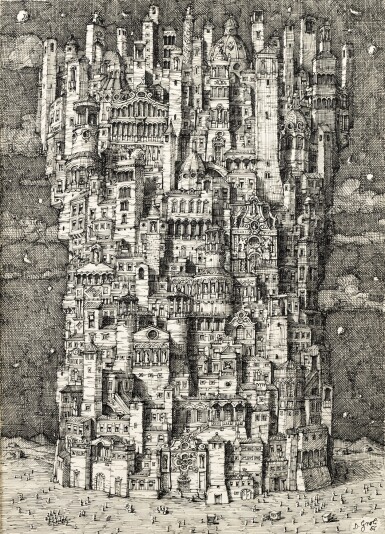Collection Pierre Le-Tan, Session I
Collection Pierre Le-Tan, Session I

Domenico Gnoli
Ville imaginaire
Auction Closed
March 16, 05:55 PM GMT
Estimate
30,000 - 50,000 EUR
Lot Details
Description
Domenico Gnoli
1933 - 1970
Ville imaginaire
signed D. Gnoli and dated 56 (lower right), inscribed in Italian (on the reverse)
India ink on paper
Executed in 1956.
51 x 36,4 cm; 20⅛ x 14⅜ in.
__________________________________________________________________________
Domenico Gnoli
1933 - 1970
Ville imaginaire
signé D. Gnoli et daté 56 (en bas à droite), inscrit en italien (au dos)
encre de Chine sur papier
Exécuté en 1956.
51 x 36,4 cm; 20⅛ x 14⅜ in.
Dorothy Dillon Eweson, United States (by descent and sold: Sotheby's, New York, February 23, 2006, lot 154)
__________________________________________________________________________
Dorothy Dillon Eweson, Etats-Unis (par descendance et vendu: Sotheby's, New York, 23 février 2006, lot 154)
Domenico Gnoli - who died of cancer at the age of 36 - is best known for his large paintings of almost abstract clothing details that connect him to Pop Art. The lesser known aspect of his oeuvre was his great talent as a draughtsman, a skill he put to work for the theatre at a very young age, first for Jean-Louis Barrault in Paris, then for John Gielgud in London and finally in New York. He also illustrated many books. This drawing is typical of the abundant images invented by Gnoli, where the populated city becomes a tower and the paper is entirely covered with small houses, and figures testifying to Gnoli's unique sense of humour.
__________________________________________________________________________
La partie la plus connue de l’œuvre de Gnoli, mort foudroyé d’un cancer à 36 ans, sont ses grands tableaux de détails de vêtement, presque abstraits, qui le rapprochent du pop-art. L’aspect le moins connu fut celui de brillant dessinateur, don qu’il utilisa pour travailler très jeune pour le théâtre, d’abord pour Jean-Louis Barrault à Paris, ensuite pour John Gielgud à Londres et finalment à New York. Il y illustra aussi de nombreux livres. Ce dessin est typique des images foisonnantes inventées par Gnoli, où la ville peuplée devient tour et le papier se couvre entièrement de petites maisons, de figures où transparaît le sens de l’humour de Gnoli.
